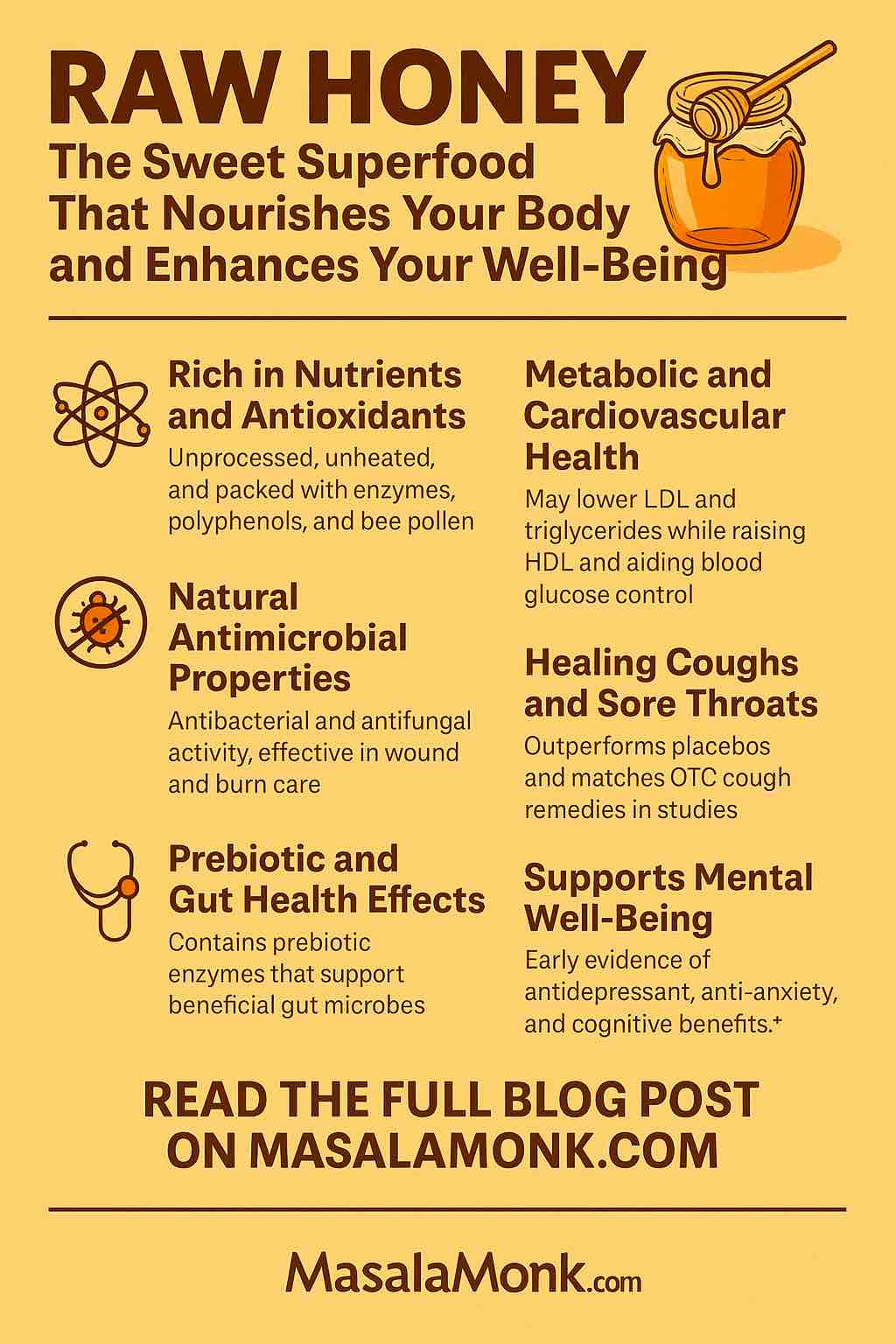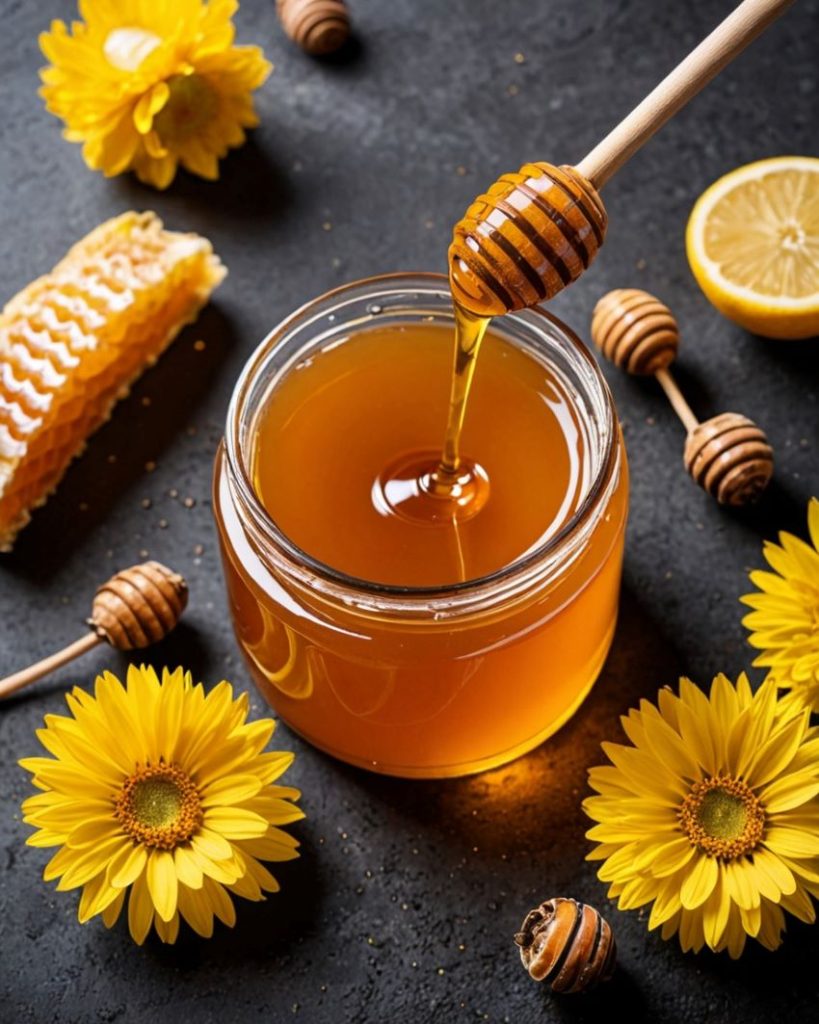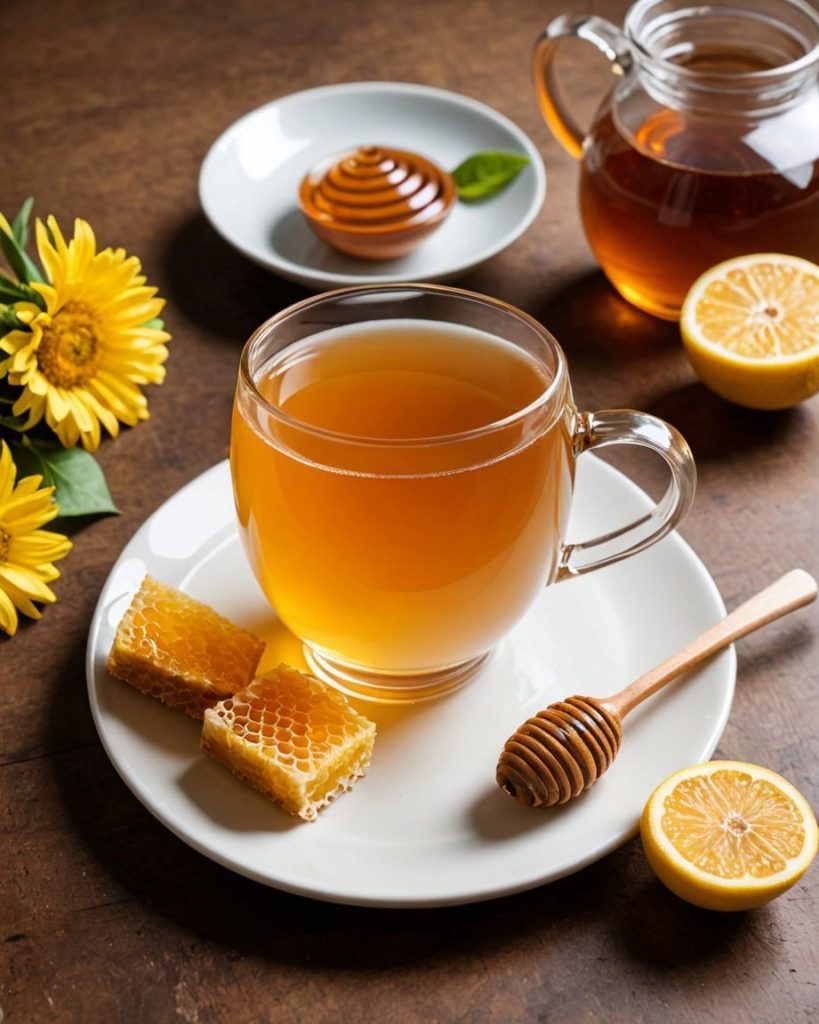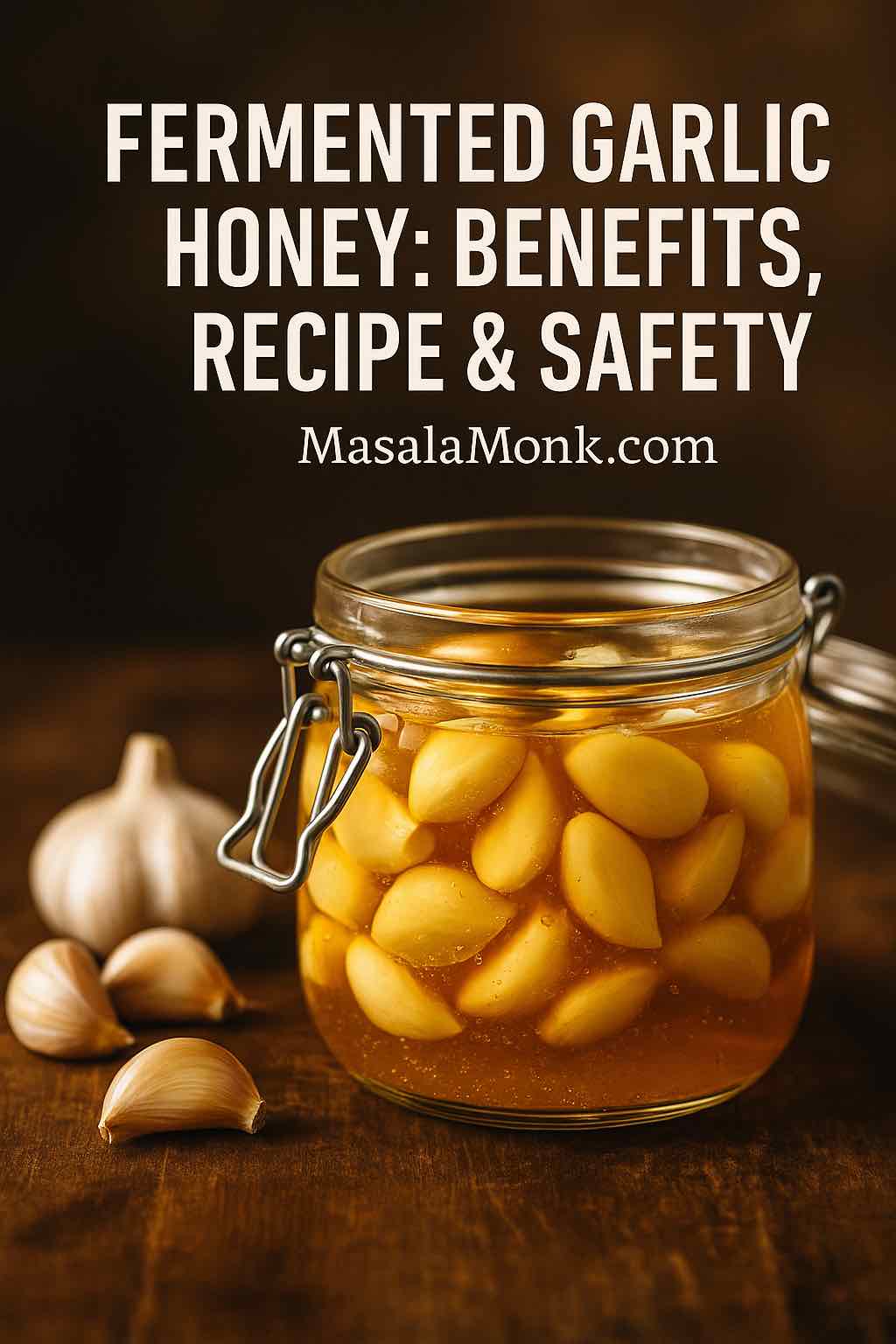
Introduction: The Jar That Keeps Showing Up
A jar of fermented garlic honey doesn’t look like much at first glance. Cloves of garlic float in amber syrup, shifting slowly as bubbles rise to the surface. Yet this unassuming mixture has traveled through centuries and across cultures, passed quietly from healer to healer, grandmother to grandchild.
Today, it sits in two worlds at once: the old one, where food was medicine by default, and the new, where wellness trends sweep through TikTok and Instagram. People keep jars on countertops not only because they’re beautiful to watch — garlic softening into translucence, honey loosening into liquid gold — but because they work. A spoonful eases coughs, a clove softens a sore throat, and the flavor itself can transform a recipe.
It is more than a honey garlic remedy. It is survival wisdom, dressed in sweetness.
What Is Fermented Garlic Honey?
At heart, fermented garlic honey is just two ingredients: raw garlic and raw honey. But when you leave them together, something extraordinary happens. Honey draws water from the garlic, lowering its thickness just enough to allow fermentation. Slowly, day by day, the mixture becomes alive.
- Garlic sheds its sharp edge, turning mellow and almost buttery.
- Honey loosens, fizzing gently, and develops a tangy, savory undertone.
- The jar itself begins to smell like a conversation between opposites — sweet, pungent, earthy, floral.
Unlike kombucha or sourdough, there’s no starter to maintain, no strict temperature to hold. You don’t need to be an expert fermenter. Instead, you need patience, curiosity, and the willingness to let nature do its quiet work.
And although the name sounds modern, the practice is ancient. Egyptians gave garlic to laborers for stamina. Greeks trusted it before athletic competitions. Chinese medicine prescribed it for clearing phlegm. Honey, meanwhile, was wound healer, throat soother, energy restorer. Inevitably, the two were combined. What we call “fermented garlic honey” today is simply a rediscovery of something humans have always known: these ingredients are stronger together.
The Benefits of Fermented Garlic Honey
The magic of fermented garlic honey lies not only in what it does inside the body, but also in how it fits into daily life. It is remedy and ritual, food and comfort. Below are the layers of benefit — scientific, practical, and cultural.
Fermented Garlic Honey as a Winter Shield
When cold winds arrive and the first sniffles spread, people reach instinctively for jars like this one. Garlic contributes compounds with antimicrobial properties, while honey brings soothing sweetness and antibacterial enzymes. In India, home remedies like honey-infused garlic (Recipe) are still trusted to ease coughs and boost immunity. Together, they feel like a shield during cold and flu season — a point echoed in MasalaMonk’s guide to garlic and honey as a dynamic duo for health.
Research backs this up. In fact, both garlic and honey show strong antibacterial activity on their own, and lab studies suggest the combination may inhibit pathogens like Streptococcus pneumoniae and Staphylococcus aureus even more effectively (Healthline, Taste of Home).
But immunity isn’t just chemistry. There’s also the ritual: stirring a spoonful of garlic in raw honey into warm lemon water on a frosty morning, or swallowing a clove when you feel a tickle in your throat. It’s a habit that makes the body feel protected and the mind reassured.
- Garlic: antimicrobial compounds.
- Honey: enzymes + soothing sweetness.
- Together: a ritual that feels protective.
A Honey Garlic Remedy for Coughs and Sore Throats
Modern studies have shown honey to be more effective than many over-the-counter cough syrups. Add garlic, softened by weeks of fermentation, and you have a remedy that soothes in two ways: sweetness coating the throat, savory warmth lingering after.
The Cleveland Clinic notes, however, that while honey and garlic are each well-studied, there’s little direct research on fermented garlic honey itself — meaning most evidence comes from their individual benefits (Cleveland Clinic).
Parents especially prize this approach. It feels safer than chemical syrups and connects them to generations of tradition.
- A spoonful before bed → calm nights.
- A clove stirred into tea → warmth with depth.
- Gentle enough for children (over one year old).
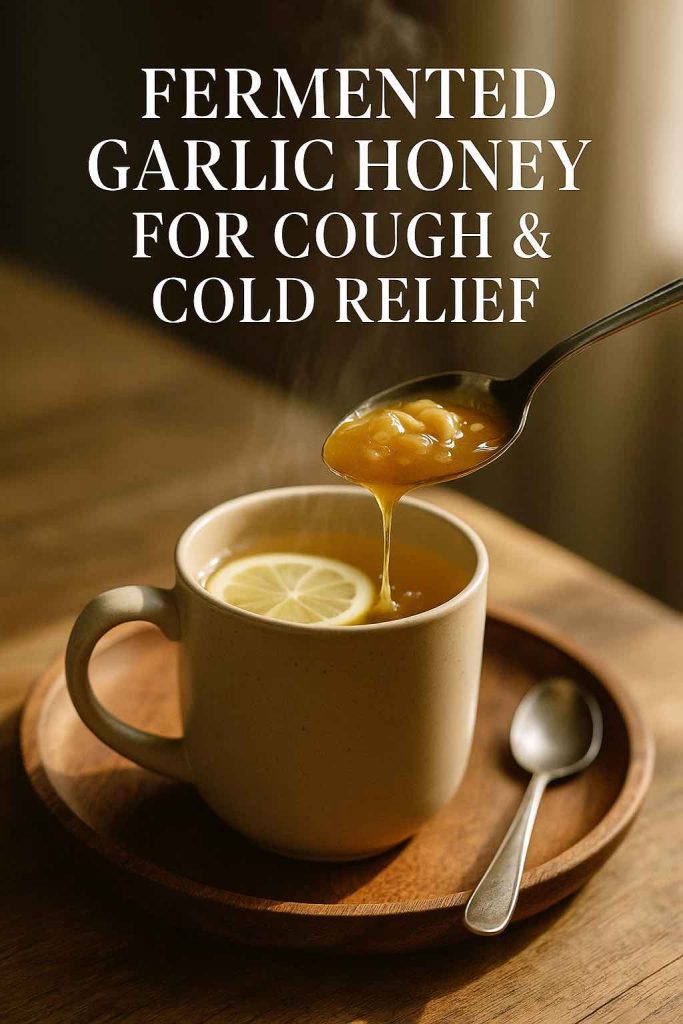
Antioxidant and Anti-Inflammatory Support
Science tells us garlic and honey carry antioxidants — compounds that protect cells from damage — and anti-inflammatory agents that reduce internal stress. Tradition tells us the same story in different words: garlic as a cleanser, honey as a balancer.
What matters most is how people feel. Some notice easier digestion; others say seasonal allergies feel lighter. For many, it’s simply the steadying comfort of a daily dose that tastes good and feels good.
A 2020 review in the Journal of Nutrition linked garlic consumption to reduced risks of atherosclerosis, hypertension, and diabetes, crediting its antioxidant and anti-inflammatory power (PMC Review).
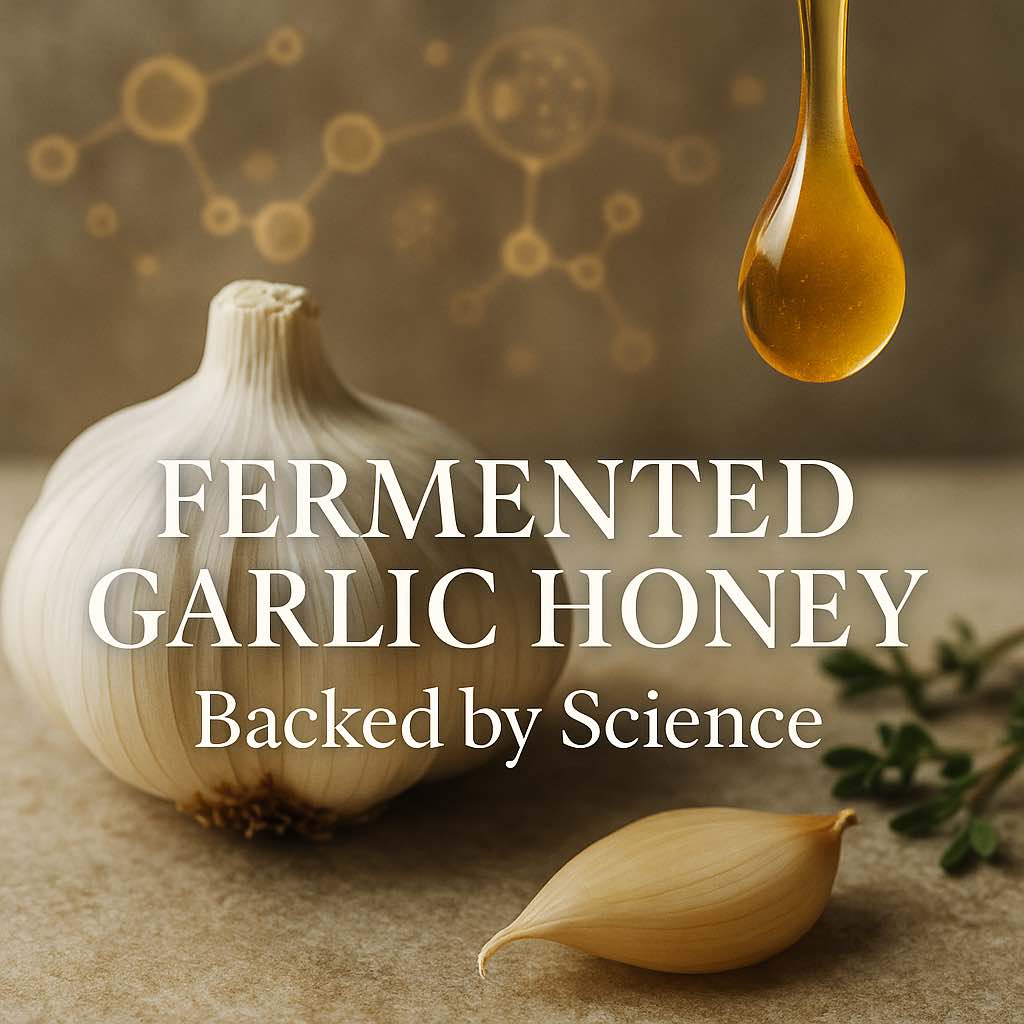
Fermented Garlic and Honey Benefits for the Heart
Garlic’s role in supporting circulation is centuries old. Modern studies link it to cholesterol and blood pressure benefits. A related MasalaMonk feature on garlic water benefits for high blood pressure shows just how potent these compounds can be, even in simple preparations. Honey contributes minerals like potassium and magnesium and is kinder to blood sugar than refined sweeteners.
The result isn’t a miracle cure — instead, it’s a daily nudge toward balance, a quiet support for cardiovascular health woven into the diet.
Recent clinical work goes further: a 2022 randomized controlled trial found that fermented garlic extract improved blood flow, nitric oxide levels, and blood pressure markers in healthy adults (PubMed Study).
A Daily Tonic That’s Actually a Pleasure
Unlike raw garlic swallowed whole or pungent herbal tonics forced down, fermented garlic honey is something people want to take. Its flavor makes consistency possible. And in wellness, consistency is everything.
Rooted in Tradition, Resonating Today
Ayurvedic practitioners called garlic warming and honey harmonizing. In Traditional Chinese Medicine, garlic moved stagnant qi while honey nourished the lungs. In Egypt, honey sealed wounds while garlic gave strength to workers.
These weren’t separate threads — they were part of a global recognition that some ingredients belong together. Today, when someone posts a jar of fermented honey and garlic on TikTok, they’re unknowingly participating in that long lineage.
Fermented Garlic Honey Safety: Clearing the Botulism Myth
Every time fermented garlic honey trends online, so does a wave of worry. The word botulism pops up in comments, often shouted louder than the remedy itself. Fear spreads faster than facts — so let’s pause and examine safety with clarity.
Botulism is a serious illness caused by the bacterium Clostridium botulinum. It thrives in low-acid, oxygen-poor environments. On paper, garlic and honey in a jar might look like an invitation. Yet reality is more nuanced.
Nutritionists interviewed by Parents.com acknowledge the popularity of fermented garlic honey online but emphasize that while the risk of botulism is extremely low, it has not been formally studied in depth. Their advice: enjoy it safely, but don’t use it as a replacement for medical treatment if symptoms are severe (Parents.com).
- Honey is naturally low in water and highly resistant to botulism spores.
- Garlic does introduce moisture, but fermentation gradually increases acidity, creating conditions that are unfriendly to harmful bacteria.
- Generations of practice back this up: herbalists, homesteaders, and healers across cultures have kept jars of garlic in honey safely for centuries.
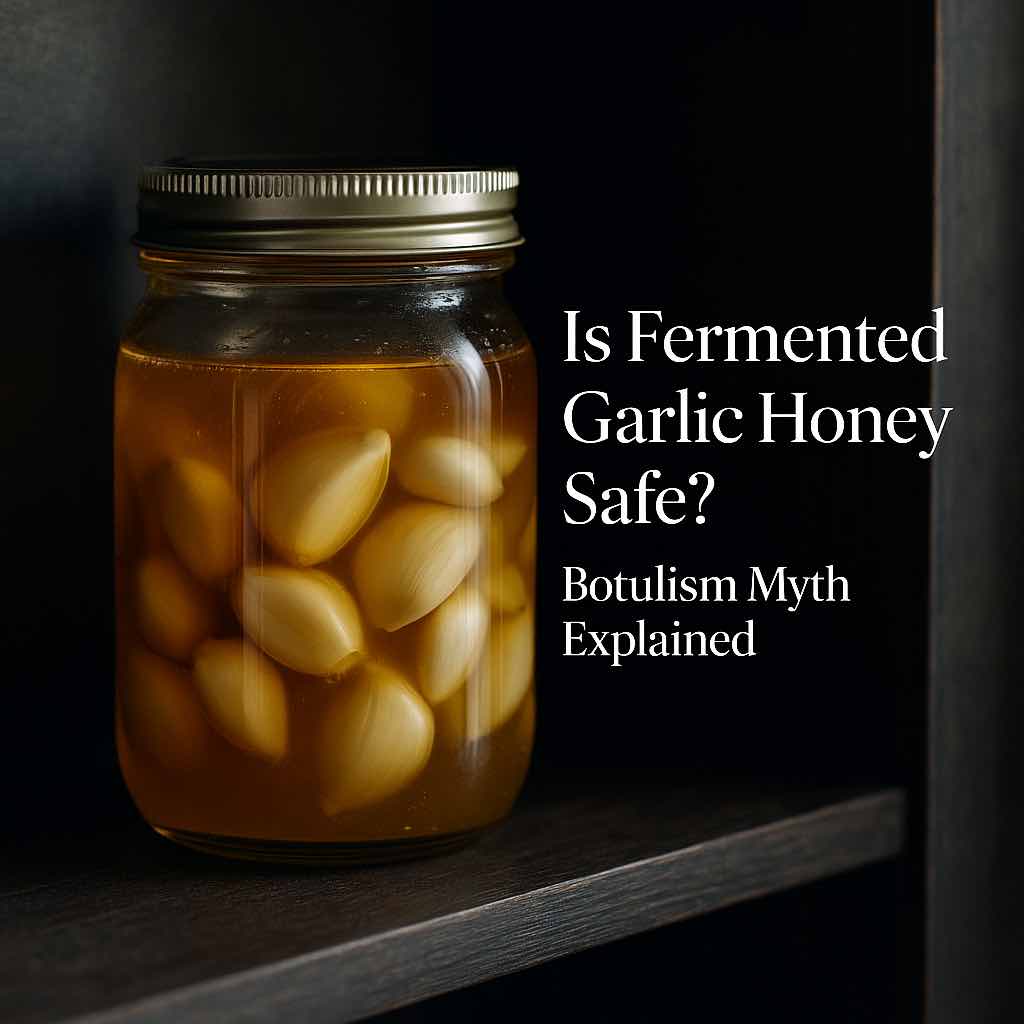
Ultimately, a jar of fermented honey and garlic is a living system. It doesn’t need fussing, but it does need attention — the same way you’d watch a sourdough starter or sauerkraut crock.
Best Practices for Safe Fermentation
To keep your jar both effective and safe, follow these common-sense guidelines:
- Use raw honey → pasteurized honey won’t ferment.
- Choose fresh garlic → firm cloves, free of mold or sprouts.
- Keep garlic submerged → honey should always cover the cloves.
- Release gas in the first week → burp the jar daily to avoid pressure buildup.
- Store cool and dark → a pantry is better than a sunny counter.
- Trust your senses → if you ever see mold or smell something unpleasant, discard and start again.
And one final note: no honey, fermented or not, should ever be given to infants under one year of age. Their immune systems aren’t ready.
Handled with this ordinary care, fermented garlic honey is considered safe for healthy adults. The risks are no greater than those of any kitchen ferment — and the benefits are far more rewarding.
If you prefer quicker remedies, MasalaMonk shares DIY natural cough syrups that deliver some of the same benefits in just a few days.
How to Make Fermented Garlic Honey at Home
There is a quiet pleasure in making your own jar. The process is simple, but the act itself feels almost ceremonial.
Picture a small pile of garlic cloves on the counter. You peel them one by one, skins flaking like paper. Each clove gets a light crush, just enough to release its juices. You drop them into a glass jar, where they clink softly against the glass.
Then comes the honey. Thick and golden, it pours slowly, folding over the garlic, trapping tiny air bubbles that shimmer before rising. You tilt the jar, making sure every clove is coated, suspended in amber.
The lid goes on — loose, not tight — because this jar will breathe. Over the first week, you’ll notice bubbles form. You’ll open it daily, just briefly, to let the gases sigh out. Slowly the honey thins, the garlic turns translucent, and the aroma becomes layered: sweet, tangy, savory.
There’s no single day when it’s “done.” Some people taste after three weeks, others wait six. Each jar is slightly different, and that’s part of the beauty. You’re not following strict steps so much as entering a relationship with garlic, honey, and time.
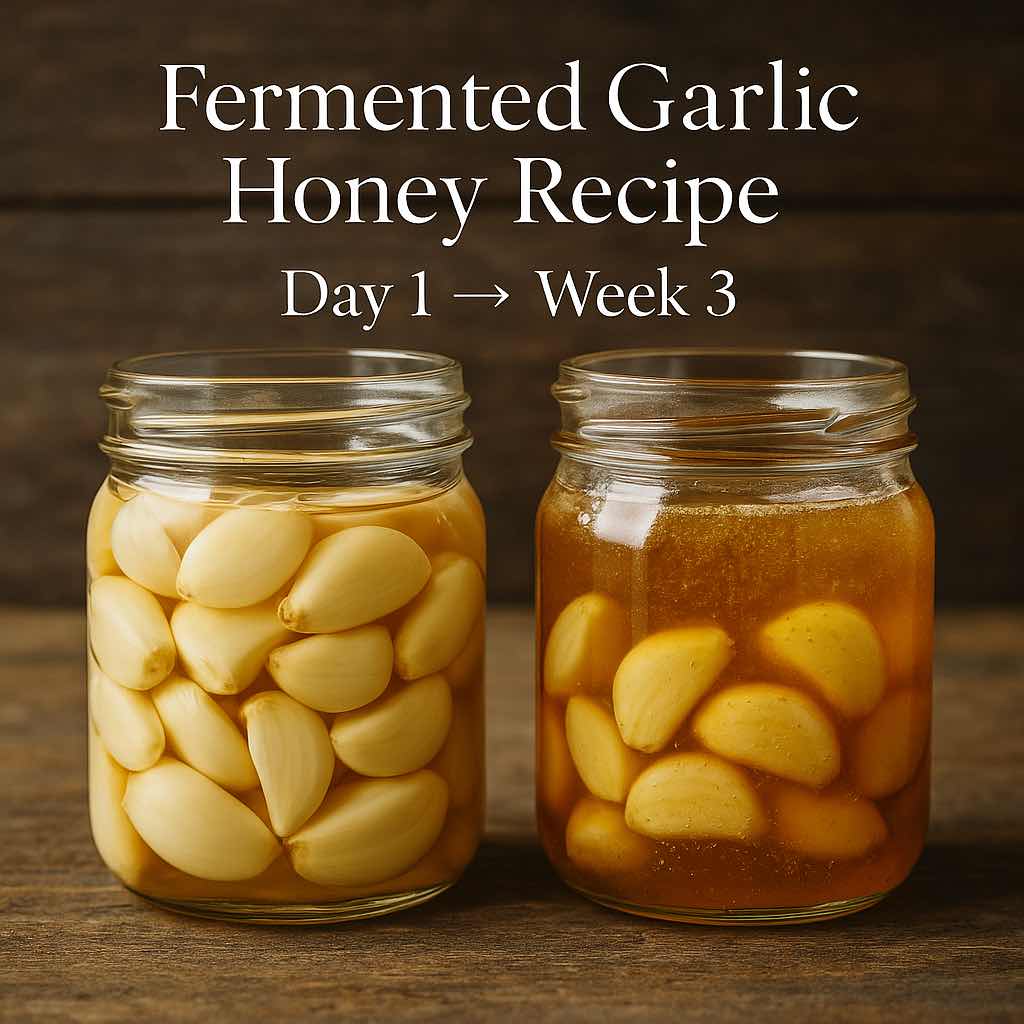
Wellness experts like Joy Bauer have shared approachable versions of this recipe, sometimes suggesting a splash of vinegar to increase acidity for extra safety assurance (EatingWell).
The Process in Brief
- Peel and lightly crush fresh garlic cloves.
- Place them in a clean glass jar.
- Pour raw honey until the cloves are submerged.
- Cover loosely and leave at room temperature.
- Burp the jar daily during the first week.
- Taste after 3–4 weeks; let it age longer for deeper flavor.
The result is not just food, not just medicine. It is a jar that connects you to tradition, patience, and the quiet transformation of simple things.
How to Use Fermented Garlic Honey
The real magic of fermented garlic honey is its versatility. A single jar can live in the medicine cabinet, the kitchen, and the morning wellness ritual — shifting roles as easily as honey itself slips from spoon to cup.
As a Natural Remedy
It’s midnight, and a cough won’t let you sleep. Instead of reaching for a neon-colored syrup, you open a jar and let a spoonful of garlic-rich honey coat your throat. The sweetness soothes instantly; the mellow garlic heat lingers like a quiet ember.
Parents especially appreciate this gentle approach. It feels safer than chemical syrups, ties them to tradition, and tastes good enough that children over one year old will accept it without fuss.
Quick ways to use it as a remedy:
- A teaspoon swallowed slowly for sore throats.
- Stirred into warm lemon water for cough relief.
- A daily spoonful in winter as an immune-support ritual.
In the Kitchen
Cooks have embraced fermented honey and garlic for its culinary depth. A chef might brush it over salmon before roasting, where it caramelizes into a glaze both sweet and savory. Another drizzles it across roasted carrots, where earthy roots meet golden tang.
At home, it appears on cheese boards, spooned over goat cheese and bread, transforming a simple snack into something elegant. Guests pause, surprised: “What is this?” It’s both familiar and entirely new.

Culinary inspirations:
- Glaze for chicken, salmon, or roasted vegetables.
- Drizzle over cheeses, breads, or flatbreads.
- Whisk into vinaigrettes or marinades.
- Blend into sauces for shrimp, tofu, or grilled meats.
As a Daily Wellness Ritual
Morning routines are personal — some brew coffee, others meditate. For many, a teaspoon of fermented garlic honey stirred into warm lemon water has become a ritual. Others take it further, blending it into immunity shots like this Flu Bomb recipe with ginger, lemon, and apple cider vinegar. Paired with apple cider vinegar, it creates a bracing tonic that wakes the body gently.
Some prefer it at night: a spoonful before bed, a comfort that signals the day’s end. It is both small and profound — the kind of act that keeps wellness woven into ordinary life.
Ideas for daily practice:
- Morning tonic: garlic honey + lemon + apple cider vinegar.
- Evening comfort: a spoonful straight from the jar.
- Seasonal support: daily teaspoon during flu season.
Why Fermented Garlic Honey Resonates Today
Why now? Why does this simple jar of garlic in raw honey capture imaginations in 2025 as much as it did centuries ago?
Part of the answer is trust. People are weary of pills, syrups, and supplements wrapped in marketing. A jar you make yourself feels tangible, honest. You can see the garlic, taste the honey, watch the bubbles rise. Wellness becomes something visible and real.
It also resonates because it belongs to two worlds at once:
- Ancient: Egyptians feeding garlic to workers, Ayurveda blending honey into tonics, Chinese medicine using both to balance the body.
- Modern: wellness influencers filming bubbling jars, chefs experimenting with glazes, scientists publishing studies on antioxidants and allicin.
Even mainstream lifestyle outlets like Vogue have covered its rise, noting that while science is still catching up, the cultural appeal of a jar you can make yourself — and actually enjoy taking — is undeniable (Vogue).
We crave stories, and fermented garlic honey gives us one. Watching a jar transform over weeks is an antidote to instant gratification. Sharing it with a friend or online community turns food into connection. Even its quiet fizzing is a reminder that life is always in motion, even in something as humble as garlic and honey.
Beyond the kitchen, MasalaMonk even explores garlic’s benefits for skin, showing how versatile this ingredient has always been.
Conclusion: A Golden Habit Worth Keeping
Fermented garlic honey is not a miracle cure. It won’t erase every cough or guarantee immunity. But it doesn’t need to. Its value lies in something deeper: the way it makes caring for yourself feel nourishing, simple, and connected to tradition.
One spoonful soothes a sore throat. Another brightens a recipe. A clove shared connects you to generations who trusted the same golden mixture.
So peel the cloves. Pour the honey. Let the jar sit and change. What you’ll have is more than a remedy or an ingredient — it’s a golden companion, alive with sweetness, savor, and the quiet reassurance that sometimes the oldest wisdom is still the best.

FAQs
1. What is fermented garlic honey?
Fermented garlic honey is made by submerging fresh garlic cloves in raw honey and allowing them to ferment naturally. The honey becomes thinner and tangy, while the garlic softens and sweetens, creating a living remedy that doubles as a versatile kitchen ingredient.
2. How long does fermented garlic honey take to make?
It usually takes 3–4 weeks before it’s ready to taste. By then, the honey loosens and bubbles appear. The flavor deepens over time, so some people enjoy it young and mild, while others prefer letting it ferment for several months.
3. Is fermented garlic honey safe?
Yes — when prepared correctly, fermented garlic honey is safe for healthy adults. Use raw honey, fresh garlic, and make sure the cloves stay submerged. Burp the jar during the first week to release gases. The main caution: never give honey, fermented or not, to infants under one year old.
4. What are the health benefits of fermented garlic honey?
The combination offers:
- Immune support during cold and flu season.
- Cough and sore throat relief, thanks to honey’s soothing effect.
- Antioxidants and anti-inflammatory compounds that support overall health.
- Cardiovascular benefits, as garlic may help with circulation and cholesterol.
5. How should I use fermented garlic honey?
There are countless ways to enjoy it:
- Take a teaspoon daily as a tonic.
- Stir into warm tea or lemon water.
- Brush onto salmon, chicken, or roasted vegetables.
- Drizzle over cheeses, breads, or flatbreads.
6. Can I make fermented garlic honey with store-bought honey?
Only if the honey is raw and unpasteurized. Most supermarket honey is pasteurized, which kills the enzymes and microbes needed for fermentation. Look for raw honey from local beekeepers or natural food stores.
7. How long does fermented garlic honey last?
When stored in a sealed jar in a cool, dark place, it can last for many months — even over a year. Its flavor evolves over time but generally stays safe as long as there’s no mold or off odors.
8. Should fermented garlic honey be refrigerated?
No, it doesn’t need refrigeration. In fact, cold temperatures may slow or halt fermentation. A pantry or cupboard is ideal, away from direct sunlight and heat sources.
9. What if my garlic turns green or blue?
Sometimes garlic develops a blue or green tint during fermentation. This is a natural reaction between garlic’s sulfur compounds and trace minerals. It looks surprising but is safe to eat.
10. Do I eat the garlic cloves or just the honey?
Both! The cloves become soft, mellow, and slightly sweet, while the honey is rich and tangy. Many people eat the cloves whole as medicine or chop them into dishes, while using the honey as a syrup or glaze.
11. Can fermented garlic honey cause botulism?
The risk is extremely low when made properly. Honey itself is inhospitable to botulism spores, and fermentation increases acidity, which makes conditions even less favorable. Following best practices — raw honey, fresh garlic, full submersion, and regular burping — keeps your jar safe.
12. Can I cook with fermented garlic honey?
Yes. Cooking will destroy some probiotic activity, but the flavor remains incredible. It’s excellent in marinades, glazes, stir-fries, and salad dressings. Many people keep one jar for remedies and another for cooking.
13. Can I add other ingredients to fermented garlic honey?
Yes. Ginger, lemon peel, chili peppers, and apple cider vinegar are popular additions. Each creates a new variation — spicy, citrusy, or more medicinal. Just make sure added ingredients are fresh and fully covered in honey.
14. Why is my honey crystallizing?
Raw honey naturally crystallizes over time. This doesn’t mean it’s spoiled. You can gently warm the jar in your hands or place it in warm (not boiling) water to re-liquify it without harming the ferment.
15. Can children take fermented garlic honey?
Yes — but only if they are over one year old. Children under twelve months should never be given honey due to the risk of infant botulism. For older children, a small spoonful can be a safe and soothing remedy.

